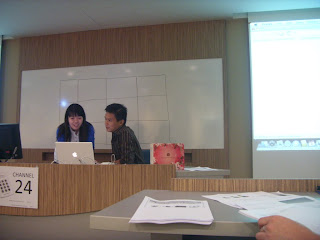We ended our presentation tonight, having presented these many weeks of CoP experience and shared our takeaways with the class. The practical value we derived from the CoP is a healthcare toolkit we came up with which we entitled, "Singapore healthcare: Myriad voices". It's a folder which we packaged for our professor and it consists of key takeaways from the topics and sub-topics, challenges we faced and recommendations, references we considered and studied in kickstarting discussion threads.
Because of the strength of your voices in the discussion, your quality inputs and your dedicated efforts in, simply, making this happen. Thank you.
Please, please continue to post your comments if possible and when you have time. Here are pictures of our presentation taken. Courtesy of a supportive classmate.
Kuan and Sufen deliberating on the presenting Wenger's principles of running Communities of Practice
JS highlighting figures from bar charts as part of his presentation on the statistical analysis
Kuan expounding on the visual roadmap of the CoP
JS "rewinding" and recollecting his thoughts.
A snapshot of half of the class
Figuring out how to get online and get hold of the Balance Scorecard







